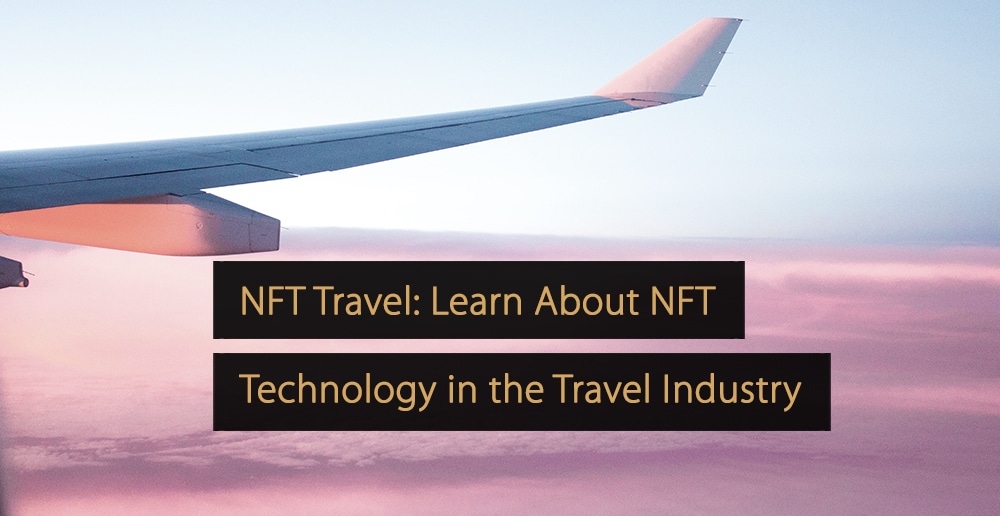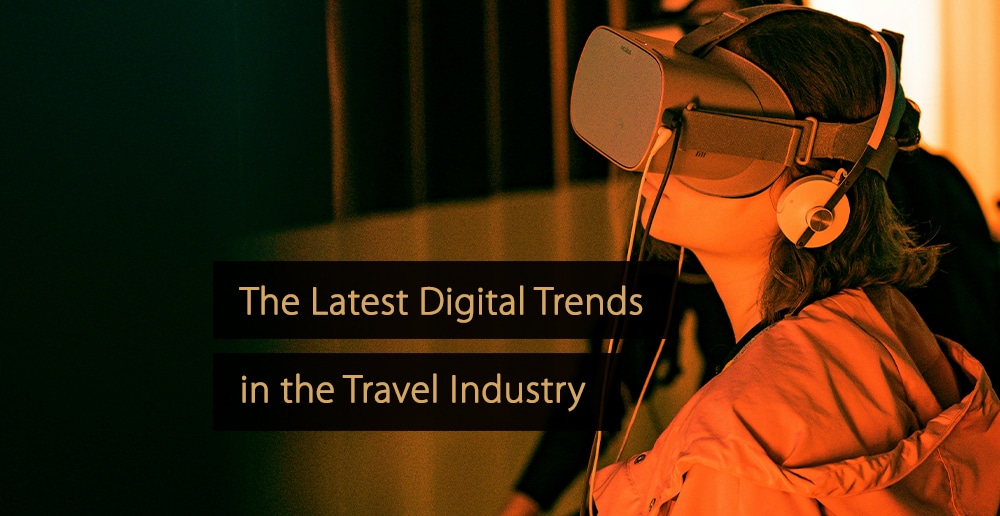NFT travel marketing and promotional opportunities are emerging, disrupting all aspects of the travel industry, including hotels, airlines, restaurants, and entertainment venues. In this article, you can find out what NFTs are, how the technology works, and how businesses use these tokens.
Table of Contents:
- What Is a Non-Fungible Token (NFT)?
- NFT Travel Marketing and the Metaverse
- Why Should NFTs Become Marketing Tools for the Travel Industry?
- How to Incorporate NFTs in Marketing for Travel Businesses
- 6 Examples of Travel Brands Embracing NFT Travel Marketing
- Blockchain Technology and NFT Travel Marketing
- Understanding Digital Travel Industry Trends
What Is a Non-Fungible Token (NFT)?
A non-fungible token, otherwise known as an NFT, is a digital asset that exists on the blockchain and cannot be duplicated. Essentially, each NFT is a cryptographic token representing a unique digital item. This allows digital content, including artwork, photographs, audio files, and videos, to be sold as unique items.
Using the example of artwork, physical art can be sold to buyers, and original work from an artist can hold significant value. Traditionally, this has been difficult to recreate with digital work, because digital files can be easily copied. NFTs provide a solution to this, as each NFT is entirely unique.
The description of these tokens being ‘non-fungible’ means that they cannot be traded at an equivalent value, which is how an NFT differs from other cryptographic assets, like cryptocurrency. NFT travel marketing is an emerging field within the travel industry, where businesses utilize NFT technology to achieve marketing goals.
NFT Travel Marketing and the Metaverse
Before getting deeper into NFT travel marketing, it is important to understand how NFTs can fit into the metaverse concept. A simple summary of the metaverse would be the creation of virtual worlds where social interactions occur, often powered by virtual reality, augmented reality, or similar technology.
Many travel and tourism brands are experimenting with the metaverse concept, providing customers with virtual spaces to share with one another, facilitating online trade shows or business meetings, or participating in existing metaverse virtual worlds. NFTs can also play a role here, allowing for selling in-game items, or virtual real estate.
Read “Metaverse Tourism: Overview, Benefits, Examples and More” to gain further insights into the metaverse in travel and tourism, the connection between the metaverse and NFTs, and examples of the metaverse in action.
Why Should NFTs Become Marketing Tools for the Travel Industry?
To fully understand the potential for NFT travel marketing, it is worth glancing at the success of NFTs in general. This can be best highlighted by the fact that total NFT sales increased by more than 21,000 percent between 2020 and 2021, with the total value of sales rising from $82.5 million to over $17 billion.
Most early NFT transactions were based on selling collectible digital items, such as original artwork, original music files, and even original celebrity Tweets. However, over time, the NFT craze has expanded beyond this, which has given rise to the sale of NFTs with functional applications.
The travel industry is ideally placed to capitalize on the collectible and functional NFT categories. The sale of NFTs can generate headlines for businesses, highlight brand values and creativity, and serve as promotional items. Yet, NFT technology can also power customer loyalty programs, exclusive club memberships, and more.
How to Incorporate NFTs in Marketing for Travel Businesses
NFTs are one of the emerging travel marketing trends, but businesses need to use the technology intelligently. In this section, you can find examples of how NFTs can boost your marketing strategy.
Partnerships and Collaborations With Digital Art Creators
One of the best ways to capitalize on NFT marketing for those working in travel businesses, including the hotel industry, is to partner with established or emerging digital art creators. This can result in creating unique digital artwork, which can be sold or given away in competitions.
This will usually work as an NFT travel marketing strategy as follows: the business contacts an artist and commissions a piece, often based on the theme of travel or a specific marketing strategy. The artist then creates the artwork, and the business sells the NFT or gives the NFT away while attempting to attract media interest.
Use NFT Technology to Create a Customer Rewards Program
Among the most innovative NFT travel uses so far have been NFT-powered customer rewards programs. Many businesses in the travel industry already run customer loyalty schemes, which aim to reward frequent customers or customers who make referrals to friends and family. However, managing all of this data can be a challenge.
However, individual customers can instead be issued an NFT containing their customer records. This helps create a unique entry for each customer, with all relevant data stored securely. The digital file the customer is given can then be used to check in to hotels or restaurants or claim loyalty points on a transaction.
New Ownership Models and Fundraising Through NFTs
Finally, an exciting new NFT travel opportunity focuses on creating new ownership models or fundraising practices based on NFT technology. For instance, hotels, restaurants, and cafes might opt to sell part of their property, and the owner can be symbolized and recorded by selling an NFT.
Businesses might opt to sell a series of NFT shares, allowing those in the local community to have an attachment to the property and an interest in its success. Alternatively, selling other NFT content could be used to generate capital quickly, which can be important for hotels, restaurants, and those in the airline industry.
6 Examples of Travel Brands Embracing NFT Travel Marketing
Although NFT travel marketing is still a relatively new phenomenon, some leading brands are already beginning to capitalize on all it offers. The sections below will provide you with information on some companies that are using this travel technology and how they have embraced it.
Travala
Travala is an online travel booking platform and the world’s leading blockchain-based online travel agency. The platform is perhaps most notable for selling travel products from more than 90,000 destinations to customers who wish to pay using cryptocurrencies, such as Bitcoin, in addition to more traditional methods, like credit and debit cards.
The brand’s involvement with blockchain technology made it ideally placed to capitalize on NFT travel marketing, and it has done so with its ‘Travel Tiger’ club. Whitelisted members can purchase a unique NFT and use it as the key to access unique ‘Smart Diamond’ rewards, including discounts, bonuses, prize drops, and reward points.
Video: Book hotels with Bitcoin on Travala.com
Marriott International
Marriott International has a history of capitalizing on the latest travel trends, and they became one of the first hotel brands to utilize NFT technology when they entered into a partnership with three digital artists, TXREK, JVY, and Erick Nicolay, to create artwork based on a Marriott marketing campaign.
The campaign was about the ‘Power of Travel’, and the artists were asked to create digital art connected to this concept. Once the artwork was created, Marriott gave the three pieces as prizes for the Art Basel Miami Beach 2021 event, generating goodwill while attracting media headlines and helping the artists.
AirBaltic
AirBaltic is a Latvian airline that attracted significant media attention when it launched its NFT travel marketing campaign. This also served as a way of promoting some of Latvia’s cities as tourist destinations.
In 2021, the airline created a range of collectible NFT art tokens featuring these cities and sold them to customers via an auction. Then, in 2022, the airline announced the expansion of its NFT strategy with the release of ‘Planies’ – NFT tokens that will serve as collectibles and tie into the brand’s customer loyalty program.
Flyfish Club
The Flyfish Club restaurant is a members-only private dining club in New York City, promoting itself as the world’s first NFT restaurant. It is also regarded as a pioneer in the NFT travel marketing space because the membership card for the restaurant is issued as a non-fungible token.
Membership tokens can only be purchased using Ether, further strengthening the brand’s connection to blockchain technology and cryptographic assets. Access to the restaurant is strictly restricted to NFT holders only, and the NFT is used to access the premises physically. Members can lease their NFT membership card to family or friends or re-sell the membership token on the second-hand market.
Dream Hollywood Hotel
The Dream Hollywood Hotel is one of the most popular hotels in Los Angeles, California, and is now ahead of the curve when creating an NFT travel marketing strategy.
The hotel partnered with The Crypt Gallery to become the first hotel in the world to host an NFT art exhibition in its lobby. The exhibition features NFT digital art, which is displayed physically in the same way you would display art in an art gallery. At the same time, the exhibition also educates visitors about NFT technology and how it works.
Ca’ Di Dio
Finally, the Ca’ Di Dio Hotel is located in Venice, Italy, and is a new hotel, which is aimed at guests who are seeking a sense of luxury. The hotel also attracted press attention through a unique NFT travel marketing approach.
Prior to the hotel opening its doors for the first time, the brand utilized the OpenSea NFT marketplace to auction off a non-fungible token. Aside from serving as a one-of-a-kind collectible, this NFT allowed the winner to experience a night in the hotel alone before other guests could visit.
Blockchain Technology and NFT Travel Marketing
The concept of NFT travel marketing is inextricably linked to blockchain technology, but senior figures in the travel industry need to understand that uses of blockchain technology extend further. For instance, blockchain can be used for secure payments, customer loyalty schemes, and check-in identification services.
Read “How Blockchain Technology is Transforming the Travel Industry” for a complete overview of how blockchain technology works, how it can benefit the travel industry, and some specific examples of its uses.
Understanding Digital Travel Industry Trends
NFT travel opportunities are increasing all the time. Still, using non-fungible tokens for marketing and customer relationship management is just one of the major digital trends to be aware of. Other examples include using fingerprint and retina recognition, investing in robots, and deploying artificial intelligence.
Look at the “Key Digital Trends in the Tourism and Travel Industry” article to learn more about the digital trends mentioned, along with many more, and the role each of these trends can play.
NFT travel marketing is still in its infancy, but as NFT technology and its use cases expand, promotional activities of this kind are likely to become more widespread. Aside from the collectible component, NFTs can also help manage customer loyalty programs or exclusive memberships and even sell travel products and services.
More Tips to Grow Your Business
Revfine.com is the leading knowledge platform for the hospitality and travel industry. Professionals use our insights, strategies, and actionable tips to get inspired, optimize revenue, innovate processes, and improve customer experience.Explore expert advice on management, marketing, revenue management, operations, software, and technology in our dedicated Hotel, Hospitality, and Travel & Tourism categories.
This article is written by:
Hi, I am Martijn Barten, founder of Revfine.com. With 20 years of experience in the hospitality industry, I specialize in optimizing revenue by combining revenue management with marketing strategies. I have successfully developed, implemented, and managed revenue management and marketing strategies for individual properties and multi-property portfolios.









Thanks you for this information about the NFT usage in travel. Very informative.